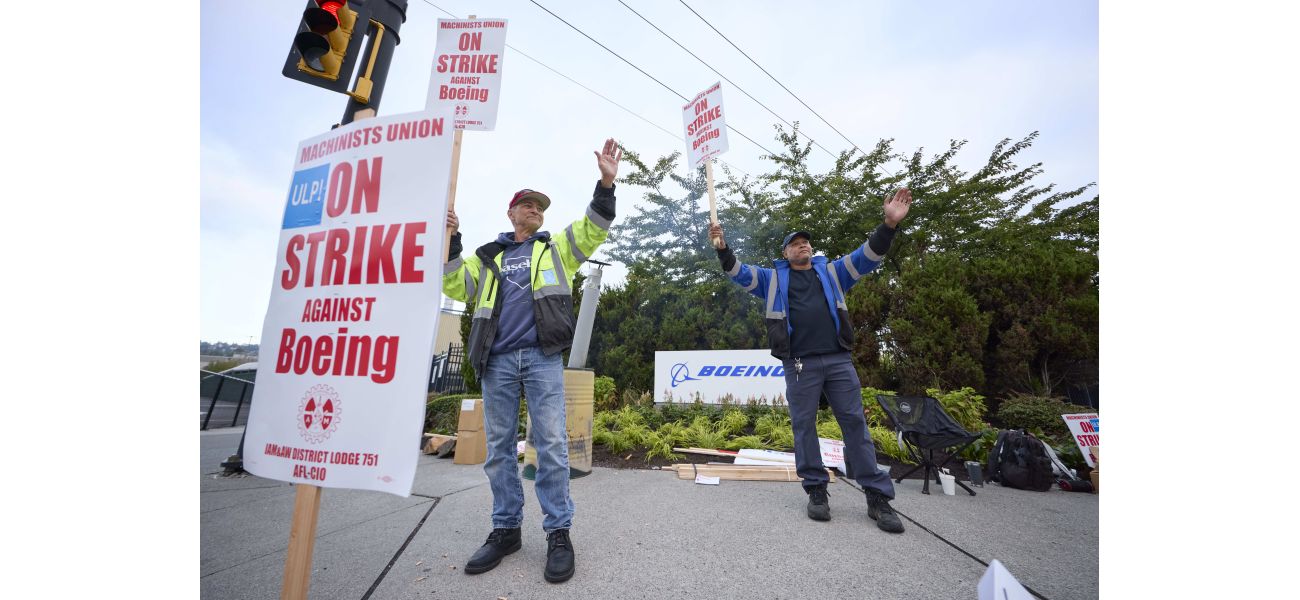Boeing factory employees strike after rejecting contract proposal.
33,000 machinists on strike won't affect flights right away, but will halt production of Boeing's popular planes, adding to the company's troubles.
September 13th 2024.

On Friday, workers who assemble aircraft at Boeing factories in Washington, Oregon, and California decided to go on strike. This came shortly after they rejected a proposed contract that would have increased their wages by 25% over the next four years. A whopping 33,000 machinists joined in the strike, which is expected to halt production of Boeing's most popular commercial planes. This is yet another setback for the company, which has already been dealing with a tarnished reputation and financial losses. As a result, Boeing's stock took a hit, dropping by 2.2% in morning trading and bringing their overall loss for the year to a staggering 38.9%.
Although the strike will not immediately affect commercial flights, it is still a significant blow to the company. The union members were not happy with the proposed contract and made their voices heard by overwhelmingly rejecting it. Shortly after midnight, workers gathered outside the Boeing factory in Renton, Washington with signs expressing their frustration. They honked car horns and played songs such as Twisted Sister's "We're Not Gonna Take It" and Taylor Swift's "Look What You Made Me Do." Many of the workers were upset about a recent decision by the company to change the criteria for annual bonuses. They felt that the proposed wage increase was inadequate, especially considering the rising cost of living in the Pacific Northwest. John Olson, a 45-year-old toolmaker, shared his disappointment, stating that he had only received a 2% raise in his six years with Boeing.
One of the main concerns for the union was that the wage offer was based on wages from 16 years ago, which did not take into account the current rate of inflation. According to Boeing, the average wage for machinists is $75,608 per year, not including overtime. The proposed contract would have increased this to $106,350 by the end of the four years. However, this fell short of the union's initial demand for a 40% pay raise over three years. The union also wanted to restore traditional pensions, which were eliminated a decade ago, but ultimately settled for an increase in Boeing's contributions to employee retirement accounts. The rejected contract also included a $3,000 lump sum payment and a reduced share of healthcare costs. In a concession to the union, Boeing agreed to build its next new plane in Washington state.
The president of the union local, Jon Holden, stated that they would survey members to determine which issues they want to focus on when negotiations resume. Boeing responded to the strike by stating that they were "ready to get back to the table to reach a new agreement." They acknowledged that the message from the union members was clear – the proposed contract was not acceptable. The company also expressed their commitment to rebuilding their relationship with their employees and the union.
It has been a rough year for Boeing, with various incidents and setbacks. In January, a panel blew out, causing a hole in one of their passenger jets. More recently, NASA chose not to send two astronauts home on a problem-plagued Boeing spacecraft. The striking machinists are responsible for assembling Boeing's top-selling 737 Max, as well as the 777 and 767 cargo planes. However, production of the Boeing 787 Dreamliner, which is built by non-union workers in South Carolina, will likely continue despite the strike.
As long as the strike continues, it will affect Boeing's ability to deliver new planes to their customers, resulting in a loss of much-needed cash. This will be a challenge for the company's new CEO, Kelly Ortberg, who was given the task of turning the company around after it has lost over $25 billion in the last six years and fallen behind its European rival, Airbus. Ortberg made a last-minute effort to save the proposed contract, which had the full support of the union's negotiators. In a meeting with the machinists, he emphasized that nobody wins in a strike and that it would put Boeing's recovery in jeopardy. He acknowledged that the company has made mistakes in the past and that they are committed to working together with the union to get back on track.
The union leader, Holden, stated that the machinists were not just striking for better wages, but also for respect. They were bitter about the stagnant wages and concessions they have made since 2008 in order to prevent the company from moving jobs elsewhere. "This is about the past, and this is about fighting for our future," Holden said when announcing the strike.
The length of the strike will determine the impact it will have on Boeing, but it is likely to be costly. In 2008, when the machinists went on strike for eight weeks, it cost the company approximately $100 million per day in deferred revenue. Before the proposed contract was announced, an analyst estimated that a strike this year could cost Boeing around $3 billion. Despite the potential losses, workers like 33-year-old toolmaker Solomon Hammond are prepared to strike indefinitely to secure a better contract. Hammond stated that Boeing's offer did not align with the current cost of living and that his $47 an hour wage was not enough to cover his expenses.
Although the strike will not immediately affect commercial flights, it is still a significant blow to the company. The union members were not happy with the proposed contract and made their voices heard by overwhelmingly rejecting it. Shortly after midnight, workers gathered outside the Boeing factory in Renton, Washington with signs expressing their frustration. They honked car horns and played songs such as Twisted Sister's "We're Not Gonna Take It" and Taylor Swift's "Look What You Made Me Do." Many of the workers were upset about a recent decision by the company to change the criteria for annual bonuses. They felt that the proposed wage increase was inadequate, especially considering the rising cost of living in the Pacific Northwest. John Olson, a 45-year-old toolmaker, shared his disappointment, stating that he had only received a 2% raise in his six years with Boeing.
One of the main concerns for the union was that the wage offer was based on wages from 16 years ago, which did not take into account the current rate of inflation. According to Boeing, the average wage for machinists is $75,608 per year, not including overtime. The proposed contract would have increased this to $106,350 by the end of the four years. However, this fell short of the union's initial demand for a 40% pay raise over three years. The union also wanted to restore traditional pensions, which were eliminated a decade ago, but ultimately settled for an increase in Boeing's contributions to employee retirement accounts. The rejected contract also included a $3,000 lump sum payment and a reduced share of healthcare costs. In a concession to the union, Boeing agreed to build its next new plane in Washington state.
The president of the union local, Jon Holden, stated that they would survey members to determine which issues they want to focus on when negotiations resume. Boeing responded to the strike by stating that they were "ready to get back to the table to reach a new agreement." They acknowledged that the message from the union members was clear – the proposed contract was not acceptable. The company also expressed their commitment to rebuilding their relationship with their employees and the union.
It has been a rough year for Boeing, with various incidents and setbacks. In January, a panel blew out, causing a hole in one of their passenger jets. More recently, NASA chose not to send two astronauts home on a problem-plagued Boeing spacecraft. The striking machinists are responsible for assembling Boeing's top-selling 737 Max, as well as the 777 and 767 cargo planes. However, production of the Boeing 787 Dreamliner, which is built by non-union workers in South Carolina, will likely continue despite the strike.
As long as the strike continues, it will affect Boeing's ability to deliver new planes to their customers, resulting in a loss of much-needed cash. This will be a challenge for the company's new CEO, Kelly Ortberg, who was given the task of turning the company around after it has lost over $25 billion in the last six years and fallen behind its European rival, Airbus. Ortberg made a last-minute effort to save the proposed contract, which had the full support of the union's negotiators. In a meeting with the machinists, he emphasized that nobody wins in a strike and that it would put Boeing's recovery in jeopardy. He acknowledged that the company has made mistakes in the past and that they are committed to working together with the union to get back on track.
The union leader, Holden, stated that the machinists were not just striking for better wages, but also for respect. They were bitter about the stagnant wages and concessions they have made since 2008 in order to prevent the company from moving jobs elsewhere. "This is about the past, and this is about fighting for our future," Holden said when announcing the strike.
The length of the strike will determine the impact it will have on Boeing, but it is likely to be costly. In 2008, when the machinists went on strike for eight weeks, it cost the company approximately $100 million per day in deferred revenue. Before the proposed contract was announced, an analyst estimated that a strike this year could cost Boeing around $3 billion. Despite the potential losses, workers like 33-year-old toolmaker Solomon Hammond are prepared to strike indefinitely to secure a better contract. Hammond stated that Boeing's offer did not align with the current cost of living and that his $47 an hour wage was not enough to cover his expenses.
[This article has been trending online recently and has been generated with AI. Your feed is customized.]
[Generative AI is experimental.]
0
0
Submit Comment





